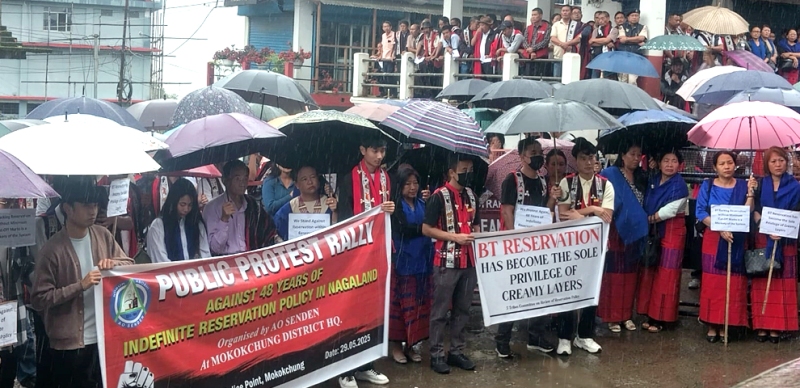Kohima: The Committee on Review of Reservation Policy (CoRRP), representing five Naga tribes, has strongly opposed the Nagaland Cabinet’s latest decision to constitute a new reservation review commission, calling it a repetition of earlier moves that fail to address their key concerns.
In a press statement issued Thursday, CoRRP convener Tesinlo Semy and member secretary GK Zhimomi said the state government had once again disregarded their core demands, particularly on ensuring a neutral and independent review of the decades-old reservation policy.
They took issue with the inclusion of civil society groups such as the Central Nagaland Tribes Council, Eastern Nagaland People’s Organisation, and the Tenyimi Union Nagaland in the newly proposed commission.
The committee reiterated that their primary demand remains the framing of clear terms of reference and the inclusion of impartial members in the review body.
CoRRP also condemned remarks made by government spokesperson and Minister KG Kenye, who defended the Cabinet’s position during a press briefing following Wednesday’s meeting.
Citing official data, Kenye said five non-backward tribes currently occupy 64% of government jobs, while the ten backward tribes hold only 34%.
To correct the imbalance, he announced, a new review commission led by a retired senior official would be formed, with a report expected within six months of its formation.
Kenye also indicated that any implementation of the commission’s recommendations might align with the Centre’s planned caste-based census in January 2026.
Reacting sharply, CoRRP accused the minister of using misleading employment statistics and said linking the commission’s findings with the upcoming census “adds insult” to their ongoing movement.
They called the government’s stance “partisan” and claimed it further erodes public trust in the review process.
The committee announced a joint meeting with five tribal apex bodies on Saturday in Kohima to decide on future action.
The demand to revisit the state’s reservation policy has gained traction in recent months.
In a joint memorandum submitted to the state government, the five apex tribal organisations under CoRRP argued that the existing policy — introduced in 1977 — no longer aligns with the present-day educational and economic landscape of Nagaland’s communities.
ALSO READ: Bangladesh under Yunus facing worsening human rights crisis: RRAG report
The original policy reserved 25% of non-technical, non-gazetted posts for seven tribes, identified as “backward” due to limited representation in public services.
Over the years, this quota expanded to 37% — 25% for Eastern Nagaland Backward Tribes and 12% for four other tribes.
CoRRP has already staged two phases of public protests — on May 29 and July 9 — with rallies held across district headquarters including Dimapur, Kohima, Mokokchung, Wokha, Zunheboto, Tseminyu, Chümoukedima, and Niuland.















